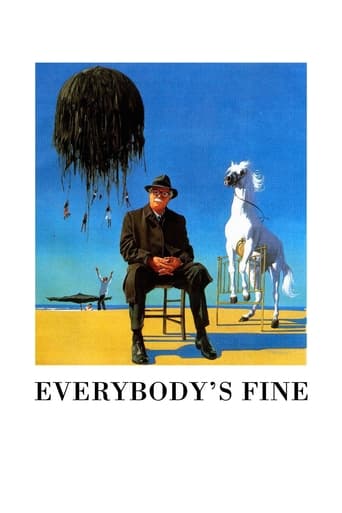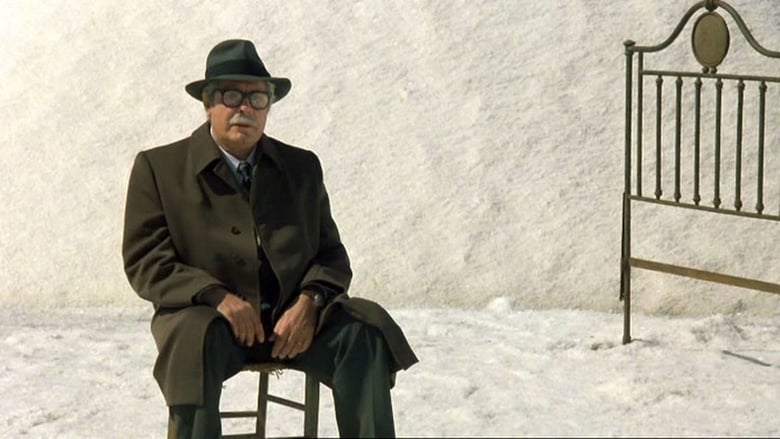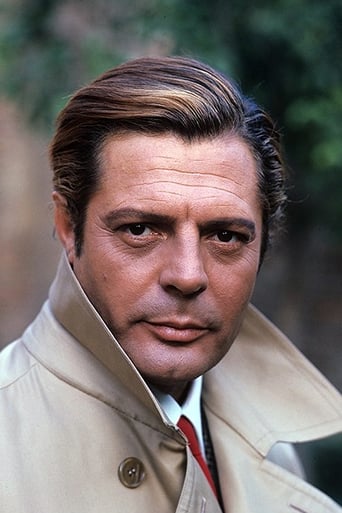

Everybody's Fine (1990)
Matteo Scuro is a retired Sicilian bureaucrat, a widower with five children, all of whom live on the mainland and hold responsible jobs. He decides to surprise each with a visit and finds none as he imagined.
Watch Trailer
Cast
Reviews
Absolutely brilliant
The thing I enjoyed most about the film is the fact that it doesn't shy away from being a super-sized-cliche;
Let me be very fair here, this is not the best movie in my opinion. But, this movie is fun, it has purpose and is very enjoyable to watch.
Great story, amazing characters, superb action, enthralling cinematography. Yes, this is something I am glad I spent money on.
I like Robert De Niro as much as anyone, however the American version of Stanno Tutti Bene reduces the main role encapsulated with such finesse and effortlessness by Marcello Mastroianni that I must insist the original be viewed to compare...I recommend anyone with a genuine appreciation of Italian cinema to rent this movie. Sadly it remains unavailable in DVD. I am advised that it will soon be.Stanno tutti Bene is without a doubt one of Mastroianni's finest performance,he captures both our eyes and our hearts as an endearing Italian patriarch. The story is simple spiced by moments of pure emotion and also humour. A sombre,sad,almost clown like humour is projected by Mastroianni's interpretation the evident disconnection with reality he is faced with really does tell us that at times "Ignorance is bliss"
STB is an Italian movie through and through - the only atypical quality being that it doesn't stink. (And that there isn't the usual amount of shouting.) This is a sort of sentimental road movie/comedy with the obligatory festival-crowd-pleasing surreal scenes, such as people freezing up at stations or a huge balloon/jelly-fish/whatever lifting up all of Mastroianni's kids up into the air. That's the sort of Felini-like stuff which IQ-starved film students go absolutely ga-ga over, regardless of whether it relates to the rest of the movie or not. "Weird stuff! Yeaaah!"As far as I'm concerned, STB isn't dull and that's all that matters. Besides, its experimental approach (if one can call it that) never has an air of pretentious baloney about it. Perhaps we have Mastroianni to thank for that, who plays it very down-to-Earth. Even when he spits out wise words of advice to his offspring there isn't that unrealistic expectation from the viewer to gasp with shock, bewilderment and awe, something very common in so many other European movies, especially from the 60s and 70s. Too many directors think they reveal the secrets of the universe in their modest little underachieving flicks. Not the case here; at least not in annoying amounts. STB is likable and even amusing at times.As for the "experimental approach", if every other movie that Italians (and other Continentals) release has the same type of surreal silliness going on, then it isn't really experimental anymore, is it? It becomes normal, unsurprising, stale even.It's far easier to cobble up a script chock-full of "metaphoric" nonsense than to actually sit down and write a compact, stirring script with a beginning, middle, and end. STB leans far more heavily toward the latter.
Mateo Scuro, like his name, is in the dark. Both symbolically and really. With his thick-lens glasses, Mateo looks out at a world that has become distorted by progress, poor eyesight and the reality of being forgotten. A pensioner who has not seen his children in years, Mateo says goodbye to his wife in Sicily and travels to the mainland of Italy to begin a journey to see his five children. He wants to surprise them and so he does not tell them of his plans. But the real surprises are waiting for Mateo.Traveling from one city to the next, Mateo calls on each child with great anticipation to see the meaningful impact they are having on Italian life. But life quickly hits Mateo squarely between the eyes and forces him to see clearly. Each child is hiding something from their father who does not see well. Their lives are not what they appear to be. They are unhappy working in menial jobs or with their relationships. But their real secret is the crushing blow for a doting father. The youngest son, Alvaro, has committed suicide and none of the others can bring themselves to telling their father the truth.Toward the end of Tornatore's cinematic statement about the isolation of being forgotten, Mateo and his two surviving sons meet for dinner. His daughters, grandchildren and of course, Alvaro, are not present. This staple of Italian life and joy, the family table, now becomes Mateo's nightmare when he learns of Alvaro's death.Tornatore is a master of the dream sequence. In the tradition of Fellini and Wertmueller, Tornatore give us insight into Mateo's deepest fears of losing his family through a dream. We see a large, black balloon, with tether ropes hanging down, descend on a beach where Mateo, his wife and children are playing years before. As this balloon descends, picks up his children and carries them away, Mateo runs to them but cannot reach them. He watches them float away into the sky. This foreshadowing of Mateo's life comes to fruition when at the film's end, Mateo is in a hospital room recovering from an episode of what can only be interpreted as the most profound disappointment of all--the loss of one's family.Upon returning home, the camera is looking into the eyes of Mateo as he recounts to his wife the details of his trip. However as the camera pans back, we see that Mateo is speaking to the headstone of the grave where his wife is buried. As he answers his wife's imagined question of how the children are, Mateo answers, "Stanno tutti bene" (Everyone's fine).Tornatore uses dream sequences and the symbolism of being out of focus as well as in the dark with masterful irony. These images are driven home with all the force of a sledge hammer as the director takes the viewer, through Mateo, on a journey of anticipated-joys, awakenings and ultimate disillusions.Mateo's dreams, failing eyesight and loneliness are his steadfast companions through his remaining years. Tornatore paints a picture for the viewer of life as a deception from the most unlikeliest of sources--those we love the most. For Mateo, being in the dark is the best kind of medicine he could hope for--a world where Stanno Tutti Bene.
A delightful visual feast and cinematic event that is thoroughly recommended. A stimulating leading role from Marcello Mastroianni and a script peppered with some brilliant gentle comedy. A subtitled film that is a joy to watch.


